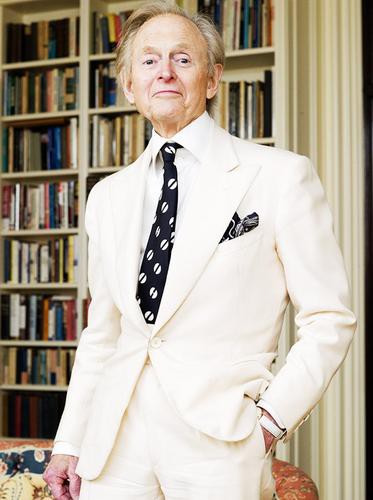Tom Wolfe was born and raised in Richmond, Virginia. He was educated at Washington and Lee (B.A., 1951) and Yale (Ph.D., American Studies, 1957) universities. In December 1956, he took a job as a reporter on the Springfield (Massachusetts) Union. This was the beginning of a ten-year newspaper career, most of it spent as a general assignment reporter. For six months in 1960 he served as The Washington Post's Latin American correspondent and won the Washington Newspaper Guild's foreign news prize for his coverage of Cuba.
In 1962 he became a reporter for the New York Herald-Tribune and, in addition, one of the two staff writers (Jimmy Breslin was the other) of New York magazine, which began as the Herald-Tribune's Sunday supplement. While still a daily reporter for the Herald-Tribune, he completed his first book, a collection of articles about the flamboyant Sixties written for New York and Esquire and published in 1965 by Farrar, Straus, and Giroux as The Kandy-Kolored Tangerine-Flake Streamline Baby. The book became a bestseller and established Wolfe as a leading figure in the literary experiments in nonfiction that became known as New Journalism.
In 1968 he published two bestsellers on the same day: The Pump House Gang, made up of more articles about life in the sixties, and The Electric Kool-Aid Acid Test, a nonfiction story of the hippie era. In 1970 he published Radical Chic & Mau-Mauing the Flak Catchers, a highly controversial book about racial friction in the United States. The first section was a detailed account of a party Leonard Bernstein gave for the Black Panthers in his Park Avenue duplex, and the second portrayed the inner workings of the government's poverty program.
In 1979 Wolfe completed a book he had been at work on for more than six years, an account of the rocket airplane experiments of the post World War II era and the early space program focusing upon the psychology of the rocket pilots and the astronauts and the competition between them. The Right Stuff became a bestseller and won the American Book Award for nonfiction, the National Institute of Arts and Letters Harold Vursell Award for prose style, and the Columbia Journalism Award.
"The right stuff," "radical chic," and "the Me Decade" (sometimes altered to "the Me Generation") all became popular phrases, but Wolfe seems proudest of "good ol' boy," which he introduced to the written language in a 1964 article in Esquire about Junior Johnson, the North Carolina stock car racing driver, which was called "The Last American Hero."
(Source)
35 works Add another?

Most Editions
Most Editions
First Published
Most Recent
Top Rated
Reading Log
Random
Showing ebooks only. Would you like to see everything by this author?
Subjects
Fiction, Social life and customs, American literature, Large type books, Wood-carving, Fiction, general, History, New York Times reviewed, American fiction, American fiction (fictional works by one author), City and town life, Drama, History and criticism, Wood-carved figurines, Wood-carving, technique, Acquaintance rape, African American lawyers, African Americans, American Reportage literature, American Short stories, Astronauts, Avocats noirs américains, Bankers, Conglomerate corporations, Conglomérats (Économie politique)Places
United States, England, New York, America, Atlanta, Atlanta (Ga.), Bronx, Georgia, Gibralter, Harlem, Manhattan, New York (State), Park Avenue, Wall Street, Alabama, Andover, Araby, Araby bazaar, Barbados, Calcutta, California, China, Eastern Europe, India, Las VegasPeople
Sherman McCoy, Abigail Williams, Amanda Wingfield, Ann Putnam, Arthur Miller (1915-), Betty Parris, Brently Mallard, Bridget Bishop, Devil, Elizabeth, Elizabeth Proctor, Ezekiel Cheever, Frederick Hart (1943-), George Herrick, George Jacobs, Giles Corey, God, Grimesby Roylott, Helen Stoner, Jim O'Connor, John H. Watson, John Hale, John Hathorne, John Proctor, JosephineTime
20th century, 1960s, 1971-, Civil War, 1861-1865, 1692, 1861-1865, 1861-65, 1945-, 19th century, 20e siècle, American Civil War, Colonial period, ca. 1600-1775, DecemberID Numbers
- OLID: OL230834A
Links outside Open Library
Alternative names
- tom-wolfe
- Tom Wolfe
- TOM WOLFE
- TOM. WOLFE
- Tom wolfe
- Tom WOLFE
- Wolfe Tom
| June 21, 2021 | Edited by Lisa | merge authors |
| January 17, 2021 | Edited by Lisa | merge authors |
| January 16, 2021 | Edited by Lisa | Edited without comment. |
| January 16, 2021 | Edited by Lisa | Added new photo |
| April 1, 2008 | Created by an anonymous user | initial import |


